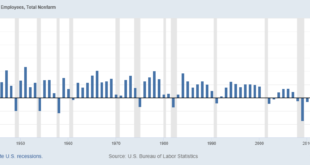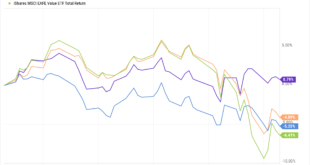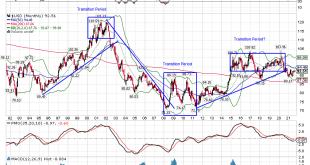Stagflation. It’s a word that strikes fear in the hearts of investors, one that evokes memories – for some of us – of bell bottoms, disco, and Jimmy Carter’s American malaise. The combination of weak growth and high inflation is the worst of all worlds, one that required a transformational leader and a cigar-chomping central banker to defeat the last time it came around. Or at least that’s how it’s remembered. Whether the cigar-chomping central banker was really...
Read More »Weekly Market Pulse: Is This A Bear Market?
I don’t know the answer to the question posed in the title. No one does because the future is not predictable. I don’t know what will happen in Ukraine. I don’t know how much what has already happened there – and what might – matters to the US and global economy. I don’t know if the Fed is making a mistake by (likely) hiking interest rates by an entire 1/4 of 1% this week. I can only see things as they are today and think about similar times in the past and know that...
Read More »David Graeber’s “Debt”
Goodreads rating 4.19. Graeber’s book contains many interesting historical observations but lacks a concise argument to convince a brainwashed neoclassical economist looking for coherent arguments on money and debt. After 60 pages, 340 more seemed too much. Chapter one: … the central question of this book: What, precisely, does it man to say that our sense of morality and justice is reduced to the language of a business deal? What does it mean when we reduce moral obligations to debts? …...
Read More »Weekly Market Pulse: Happy Anniversary!
Today is the 50th anniversary of the “Nixon shock”, the day President Richard Nixon closed the gold window and ended the post-WWII Bretton Woods currency agreement. That agreement, largely a product of John Maynard Keynes, pegged the dollar to gold and most other currencies to the dollar. It wasn’t a true gold standard as only other countries that were party to the agreement could demand gold in exchange for their dollars, but it was at least a standard of some...
Read More »Notions of Liquidity Trap
On Fazit, Gerald Braunberger reviews the concept of “liquidity trap.” Keynes never used the term but Robertson did. Hicks introduced the common notion (represented, e.g., by a flat LM curve). Krugman talks about a different trap. So does Blanchard and he (incorrectly) attributes it to Keynes. So does Sinn.
Read More »How Keynesian Ideas Weaken Economic Fundamentals
Whenever there are signs that the economy is likely to fall into an economic slump most experts advise that the central bank and the government should embark on loose monetary and fiscal policies to counter the possible economic recession. In this sense, most experts are following the ideas of the English economist John Maynard Keynes. Briefly, John Maynard Keynes held that one could not have complete trust in a market economy, which is inherently unstable. If left...
Read More »Don’t Want a Liquidity Trap? More Saving Is the Answer
With interest rates in many countries close to zero or even negative, some commentators are of the view that monetary policy of the central banks are likely to become less effective in navigating the economy. In fact it is held that we have most likely reached a situation that the economy is approaching a liquidity trap. But what does this mean? In the popular framework of thinking that originates from the writings of John Maynard Keynes, economic activity is...
Read More »Le retour de l’or sur la scène monétaire mondiale?
Mars 2009, le gouverneur de la Banque populaire de Chine M Zhou Xiaochuan revint dans le cadre d’une conférence intitulée Reform the international Monetary System sur la vision de Keynes au sujet du bancor.Pour lui, le système centré sur le dollar américain et les taux de changes flottants, plus ou moins librement, devrait être repensé. Bancor: À l’occasion du sommet de Bretton Woods en 1944, deux plans de création de...
Read More »Models Make Economics A Science
In the Journal of Economic Literature, Ariel Rubinstein discusses Dani Rodrik’s “superb” book “Economics Rules.” The article nicely articulates what economics and specifically, economic modeling is about. Some quotes (emphasis my own) … … on the nature of economics: [A] quote … by John Maynard Keynes to Roy Harrod in 1938: “It seems to me that economics is a branch of logic, a way of thinking”; “Economics is a science of thinking in terms of models joined to the art of choosing models...
Read More »Roger Farmer’s “Prosperity for All”
On his blog, Roger Farmer advertizes his new book, “Prosperity for All,” and argues that governments should stabilize asset prices: Following the Great Stagflation of the 1970s, economists backtracked and revived the classical economic theory that had dominated academic economics for a hundred and fifty years, beginning with Adam Smith in 1776 and culminating in the business cycle theory described by Keynes’s contemporary Arthur Pigou in his 1927 book, Industrial Fluctuations. That...
Read More » Swiss Economicblogs.org
Swiss Economicblogs.org




